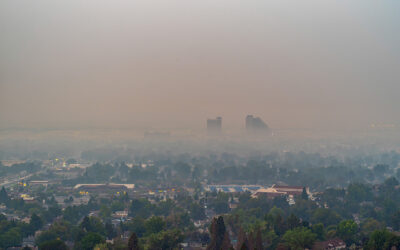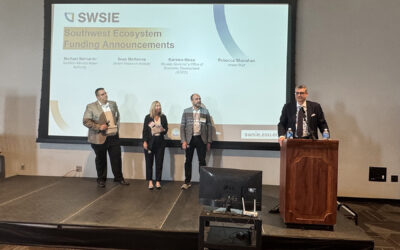14,000 Nevadans quickly report on signs and symptoms to enhance predictive public health models for Nevada.
Reno, Nev. (April 1, 2020) – The Healthy Nevada Project, a first-of-its-kind, community-based population health study combining genetic, clinical, environmental and social data, offers free genetic testing to every Nevadan interested in learning more about their health and genetic profile. With more than 50,000 study participants enrolled in just three years, the Healthy Nevada Project has become the fastest-enrolling genetic study in the world. Now, the team is demonstrating that they can quickly assess how thousands of people across Nevada are experiencing the COVID-19 pandemic.
The Project was created by Renown Institute for Health Innovation (Renown IHI) – a collaboration between Reno, Nev. based not-for-profit health network, Renown Health, and the world leader in environmental data, Desert Research Institute (DRI). Leveraging Renown’s forward-thinking approach to community health care and DRI’s data analytics and environmental expertise, Renown IHI has grown its capabilities to lead a large, complex research study of significance that is able to analyze and model public health risks in Nevada and serve as a national model for future population health studies working to improve overall health through clinical care integration.
Utilizing the study’s unique online survey tools, a population health research team at the Renown IHI, led by Joseph Grzymski, Ph.D., last week began asking consented participants about their COVID-19 experiences. A 13-question online survey sent to participants included questions about possible exposure and risks of the novel COVID-19 virus, such as recent domestic and international travel, attendance at large public events, and if participants are experiencing any symptoms of COVID-19 such as a fever.
“We’ve had over 14,000 participants respond as of Monday,” explained Joseph Grzymski, Ph.D., an associate research professor at the Desert Research Institute (DRI), Chief Science Officer for Renown Health, and principal investigator of the Healthy Nevada Project. Grzymski says initial data shows that:
- 22-percent (3,080) of respondents reported that they had traveled outside of Nevada in the past 14 days, but very few (less than 700) had traveled to or been in contact with individuals recently in China, Iran, or Italy.
- Approximately 30-percent (4,100) of individuals who responded had taken their temperature in the previous 48 hours, with 5-percent (more than 200 individuals) reporting they had an elevated temperature.
“Nevada’s ability to test patients suspected (or at high risk) for COVID-19 on a broader scale is extremely important to containing this pandemic and ensuring proper treatment,” said Anthony Slonim, M.D., Dr.PH., FACHE, president and CEO of Renown Health. “The data that Healthy Nevada Project participants are sharing with us is critical to helping our IHI data scientists and researchers better understand, anticipate and plan for Nevada’s broader population-level health risks in the coming weeks and months.”
“We have and continue to be proactive in dealing with the best evidence provided by the CDC, the World Health Organization, our counterparts around the nation and State and County Health Departments. Renown physicians
and staff continue to enact the emergency preparedness plans we have been developing for months to create additional capacity for inpatients and to continue to deliver high-quality care during the anticipated surge in COVID-19 cases in northern Nevada based on predictive analytical models used by Renown. The survey data that Healthy Nevada Project participants have given our researchers is key to helping us assess the risks, possible exposure, and presence of COVID-19 symptoms across Nevada. We thank every participant for taking the time to help us, help them.”
Other insights from the initial Healthy Nevada Project, COVID-19 survey results include:
- 17% (~2,400 individuals) had experienced a dry cough in the past 14 days;
- 3.8% reported to be in known contact with individuals at risk for COVID-19, with 45 individuals reporting they had been in contact with a known case of COVID-19 and a further 16% were uncertain about possible contact;
- 92% (~13,000 individuals) of respondents consented to be re-contacted for further testing and additional information about COVID-19.
Grzymski said in addition to providing an ongoing analysis of survey responses to Renown Health, researchers are also working to understand if there could be genetic mechanisms responsible for the severity of COVID-19 illness.
“This COVID-19 situation is, “not a sprint, it is a marathon,” added Slonim, “at Renown, we have put many exceptional plans in place to safely screen, diagnose and treat members of our community who come to us for care. We have effectively trained and practiced these measures throughout the years, and are now ready to implement them as needed. At the same time, we continue to refine, in real-time, the data that supports our predictive analytic models. We are using every tool and resource-including this data from Healthy Nevada Project participants, to ensure that we are meeting both the health and healthcare needs of the people we serve.”
Slonim explained, “The past two months have been a challenging time as our city, the nation and healthcare colleagues around the world are addressing the evolving COVID-19 situation. Yet here in Nevada, standing proudly with all of you across this state – I see hope and determination. The passion and commitment, expertise and the unparalleled care our health teams are providing to all of those who need care, along with community engagement in research studies like this, will continue to get us through the months ahead.
“We are thrilled to see the constant, fast-paced evolution of the Healthy Nevada Project and the way our participants have responded so quickly to our requests,” said Joseph Grzymski, Ph.D. “the data that our participants have provided us, in less than a week, has allowed us to discover risk factors within communities and take action to live longer, healthier lives. That’s what makes the Healthy Nevada Project so exciting for all of us.”
For more about the Healthy Nevada Project please visit healthynv.org.
For up-to-date information on Renown’s approach to keeping our community safe, visit renown.org/covid/
Renown Institute for Health Innovation is a collaboration between Renown Health – a locally governed and locally owned, not-for-profit integrated healthcare network serving Nevada, Lake Tahoe, and northeast California; and the Desert Research Institute – a recognized world leader in investigating the effects of natural and human-induced environmental change and advancing technologies aimed at assessing a changing planet. Renown IHI research teams are focused on integrating personal healthcare and environmental data with socioeconomic determinants to help Nevada address some of its most complex environmental health problems; while simultaneously expanding the state’s access to leading-edge clinical trials and fostering new connections with biotechnology and pharmaceutical companies. Learn more atHealthynv.org.


